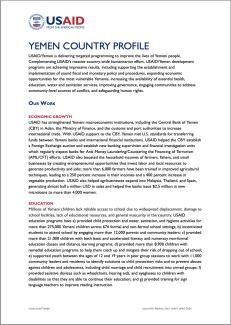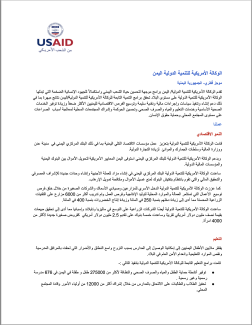OVERVIEW
In addition to crisis response and humanitarian assistance, USAID’s development assistance to Yemen addresses the underlying causes of instability in the country by supporting flexible and innovative programs to lay a stronger foundation for durable peace.
Our Work
ECONOMIC GROWTH
USAID has strengthened Yemeni macroeconomic institutions, including the Central Bank of Yemen (CBY) in Aden, the Ministry of Finance, and the customs and port authorities to increase international trade. With USAID support to the CBY, Yemen met U.S. standards for transferring funds between Yemeni banks and international financial institutions. USAID helped the CBY establish a Foreign Exchange auction and establish new banking supervision and financial investigation units which regularly inspect banks for Anti-Money Laundering/Countering the Financing of Terrorism (AML/CFT) efforts. USAID also boosted the household incomes of farmers, fishers, and small businesses by creating entrepreneurial opportunities that invest labor and local resources to generate productivity and jobs; more than 6,000 farmers have been trained in improved agricultural techniques, leading to a 250 percent increase in their incomes and a 400 percent increase in vegetable production. USAID also helped agribusinesses expand into Malaysia, Thailand, and Spain, generating almost half a million USD in sales and helped five banks issue $2.5 million in new microloans to more than 4,000 women.
EDUCATION
Millions of Yemeni children lack reliable access to school due to widespread displacement, damage to school facilities, lack of educational resources, and general insecurity in the country. USAID education programs have a) provided child protection and water, sanitation, and hygiene activities for more than 275,000 Yemeni children across 676 formal and non-formal school settings; b) incentivized students to attend school by engaging more than 12,000 parents and community leaders; c) provided more than 21,000 children with both basic and accelerated literacy and numeracy non-formal education classes and distance learning programs; d) provided more than 8,900 children with remedial education programs to help them catch up and mitigate their risk of dropping out of school; e) supported youth between the ages of 12 and 19 years in peer group sessions to work with 11,000 community leaders and residents to identify solutions to child protection risks and to prevent abuses against children and adolescents, including child marriage and child recruitment into armed groups; f) provided assistive devices such as wheelchairs, hearing aids, and eyeglasses to children with disabilities so that they are able to continue their education; and g) provided training for sign language teachers to improve reading instruction.
GOVERNANCE, PEACE, AND STABILITY
Nine years of war debilitated Yemen’s government structures and institutions, fueled internal political divisions, and left its leadership ill-prepared to lead peacebuilding efforts that are critical to a lasting peace. Declining socio-economic conditions have also exacerbated intra- and inter-communal conflicts, further marginalizing vulnerable populations such as children, youth, and women. USAID partners with national and local level governments, political leaders, civil society, and communities to promote more effective and responsive governance at all levels, increase citizens’ confidence in their government, and enhance community-level resilience to drivers of conflict. USAID has a) Contributed to a 28 percent increase in community members’ level of trust in local institutions through local conflict reconciliation programming, b) supported the development of the Youth Ministry’s National Action Plan and 12 socio-economic projects informed by youth needs, c) enhanced the negotiation, networking, and communications skills of 61 female political party leaders to increase women’s political participation, d) established a 36-member Social Peace Assembly that implemented durable solutions for local conflicts in Hadramawt in partnership with local authorities, e) launched ten subgrants to Yemeni community-based organizations, including two women-led organizations, to prevent child recruitment efforts by armed groups and address climate change-induced conflicts through inclusive dispute resolution mechanisms, and f) launched an online platform that has reached 9,918,716 Yemenis, generating 751,529 engagements and 2,912 comments on issues of conflict and climate change.
HEALTH
Close to 20 million people in Yemen lack access to basic health services and only 52 percent of Yemen’s health facilities are able to provide minimal services. Most facilities lack specialists, equipment, and medicines. USAID partners with the Yemen government and other local partners to improve reproductive, maternal, newborn, and child health and nutrition services, to promote healthy behaviors, and to strengthen the country’s health sector. USAID builds capacity within Yemen’s health systems at the community and primary care level, provides essential supplies and equipment to health centers and hospitals, reduces structural and individual-level barriers to accessing care, and spreads awareness and prevention messages to encourage vaccination and curb the spread of communicable diseases. This includes building the skills of health facility staff and community midwives to deliver higher quality care, engaging communities to promote healthy behaviors, improving district health authorities’ management skills, strengthening the referral system for complicated cases to receive specialized care, and strengthening Yemen’s health management information system to provide better data for decision-makers. USAID has a) provided diarrhea treatment to 11,000 children under five years of age and vaccination to 10,000 infants under one year against diphtheria, tetanus and pertussis; b) supported 219 health facilities with family planning and reproductive health training and reached 647,000 women with family planning methods; and c) supported Yemen’s response to COVID-19, reaching more than 1.2 million with the COVID-19 vaccine and providing 25,000 oxygen cylinders to health facilities.
WATER, SANITATION, AND HYGIENE (WASH)
Yemen is experiencing one of the world’s worst water crises. Water, sanitation, and hygiene (WASH) needs have significantly increased due to destruction of infrastructure, large-scale displacements, lack of water resources management, and impacts of climate change. USAID has helped 1.8 million vulnerable Yemenis access clean water and improved sanitation services. USAID assistance has: a) increased access to water for more than 650,000 beneficiaries through rehabilitation of water systems; b) improved sanitation services for more than 600,000 people through repaired sewage networks, installation of toilets and handwashing facilities at health facilities, and construction of household latrines; and c) conducted hygiene promotions and behavior change sessions benefiting more than 500,000 Yemenis on hygiene practices for maximizing the health benefits of safe water sources and sanitation facilities and as a vital step to curbing diseases.
HUMANITARIAN ASSISTANCE
The United States is the leading donor of humanitarian assistance to Yemen, providing nearly $6 billion in funding since the conflict began. In Fiscal Year 2023, USAID provided more than $685 million to the humanitarian response in Yemen. Working through 19 NGO and seven UN partners, USAID provides critical cash, food, health, nutrition, protection, shelter, and WASH assistance to at-risk populations across Yemen. An estimated 17.6 million people in Yemen are facing high levels of food and nutrition insecurity. USAID provides food assistance, primarily through U.S.-sourced commodities, to food-insecure populations across the country, prioritizing communities facing emergency and catastrophic levels of food insecurity. USAID partners provide nutrition support through static health facilities and mobile medical teams by integrating health, nutrition, and WASH interventions to comprehensively assist vulnerable populations. In response to the deterioration of Yemen’s health system, USAID’s health partners also provide primary health care services and conduct hygiene promotion activities in hard-to-reach areas throughout Yemen. USAID also provides multipurpose cash assistance to vulnerable households to meet their basic needs, reduce the use of negative coping strategies, and support local markets. USAID also addresses child protection and psychosocial support needs, prevents and responds to gender-based violence and other protection risks and violations through community mobilization activities and specialized case management services. In addition, USAID works to expand access to safe drinking water and prevents and responds to communicable disease outbreaks in Yemen, particularly among internally displaced person populations.


